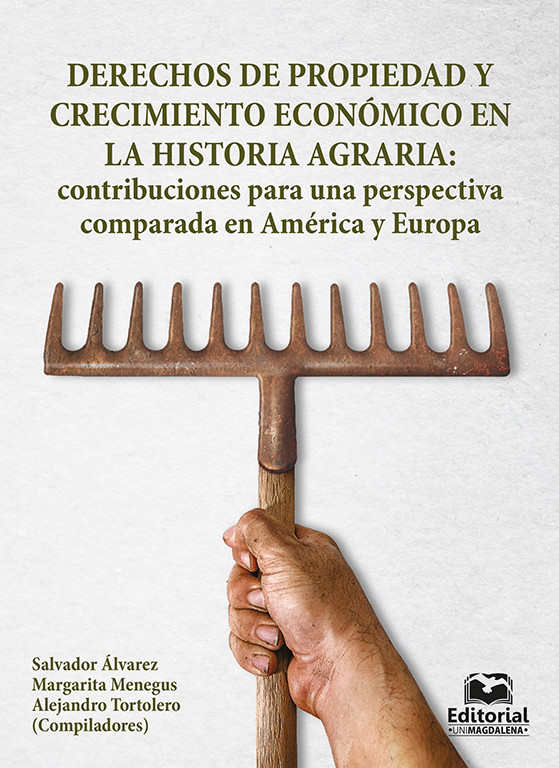
- Edición: 1
- Año de edición: {{getMes(6-1)}} de 2018
- No. de páginas: 394
- Formato: Impreso , Ebook
- Idioma: Español
- ISBN Impreso: 9789587461206
- ISBN PDF: 9789587461213
Derechos de propiedad y crecimiento económico en la historia agraria: contribuciones para una perspectiva comparada en América y Europa
View title and subtitle in English
Title in English: Property rights and economic growth in agriculture history: contributions to a comparative perspective in America and Europe
Tabla de contenido
Description in English: According to institutional economics, institutions are essential agents of economic and agricultural progress. Clear property rights are a factor for the growth of production, and a perfect property system would be a priority condition for achieving progress in agriculture. Enclosures are carried out in England, while in France, the revolution and the Civil Code and its adoption beyond its borders are seen as engines of economic development in the countryside, despite the absence of enclosures in France and a civil code and an absolute right of property in England. However, large English property would have accompanied innovation, while small French property would not have experienced it as much. An absolute, perfect property right would facilitate, among other things, the circulation of property through a real estate market freed from obstacles that prevent it from functioning. At the same time, an active real estate market would ensure a selection of the best farmers and promote an increase in production.This book examines these ideological constructions that do not always align with reality, as they transmit many inaccuracies and contradictions. It is not clear, for example, that imperfect ownership is an obstacle to the growth of agriculture. Nor is it evident that the disappearance of all overlapping forms of property and its uses, or the suppression of collective property, is necessary to achieve an agricultural revolution, nor is it essential to accelerate the circulation of real estate assets. It has not been proven that a dynamic real estate market is synonymous with the expropriation of the peasantry and that it is favorable to the emergence of a capitalist mode of production. Nor is it certain that the assets of deceased hands were less well managed than others. It is not true that France, for example, has been a country of small property, and it is also inaccurate to think that small property owners have been incapable of taking initiatives to respond to market demands. In light of the critical examination of these problems, a group of European and Latin American researchers offer their contributions to clarify these issues throughout the pages of this book.View description in English
Tabla de contenido
- OCDE (Área, Subárea y Disciplina) Humanidades > Historia y arqueología > Historia
- Colección y serie: Humanidades y Artes > Historia
- Categoría: Libro producto de investigación
- THEMA: Historia de la economía
- BISAC: NEGOCIOS ECONÓMICOS > Historia Económica
- DEWEY: Sociología y Antropología > Ciencias económicas > Ciencias económicas
- Edición: 1
- Año de edición: 2018
- ISBN impreso: 9789587461206
- DOI:
- No. de páginas: 394
- Medidas en cm (Alto, Ancho, Grosor): 24, 17, 2
- Idioma: Español
- Formato: PDF, EPUB
- Edición: 1
- Año de edición: 2018
- ISBN PDF: 9789587461213
- No. de páginas: 394
- DOI:
- Idioma: Español



